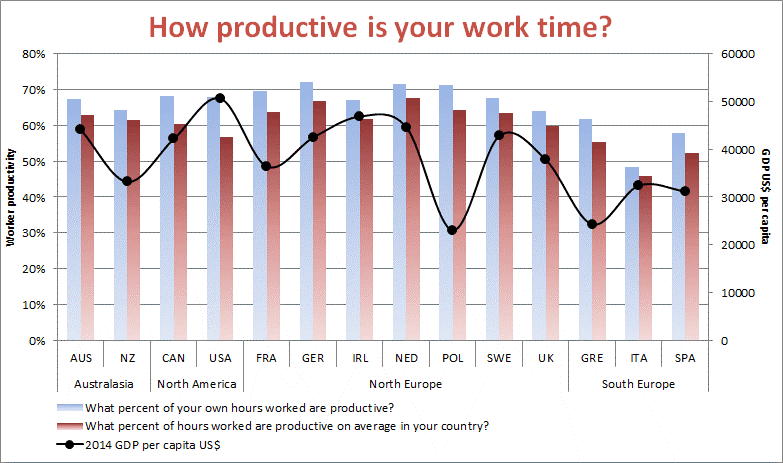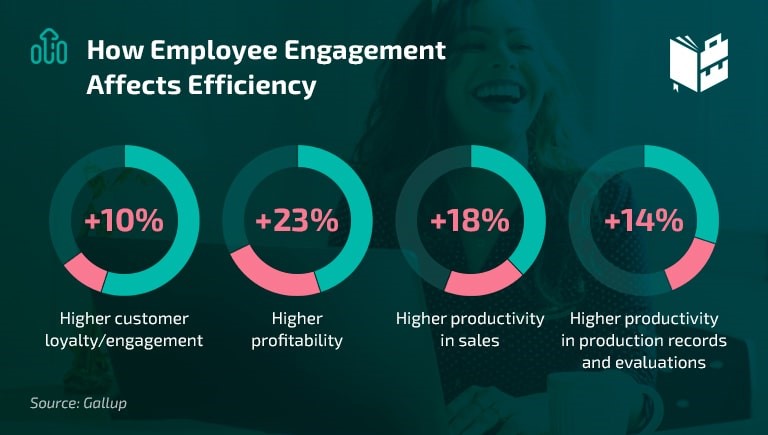Managing Psychosocial Hazards in business: A Strategic Approach to Wellbeing & Performance
29th May , 2025
At International Business Mentors, we find that staff motivation directly impacts the productivity and effectiveness of organisations. However, there are also significant differences between countries, as the following chart shows.
Motivation impacting productivity is supported by research that consistently demonstrates a strong positive relationship between employee motivation and productivity. Motivated employees tend to be more engaged, efficient and committed, leading to enhanced organisational performance:
- Oxford University Study – An extensive study conducted by Oxford University’s Saïd Business School in collaboration with British Telecom found that happy workers are 13% more productive. The research highlighted that happier employees worked faster and converted more calls to sales.
- Harvard Business School Analysis – A review by Harvard Business School estimated that a meaningful increase in employee wellbeing yields, on average, a 10% increase in productivity. The study emphasised the causal effect of wellbeing on productivity across various industries.
- Correlation Coefficient Study – Research published on ResearchGate reported a correlation coefficient of 0.771 between employee motivation and productivity, indicating a strong positive relationship. The study concluded that employee motivation has a significant impact on productivity.
The Benefits of Higher Employee Engagement
More engaged employees have many benefits for customer engagement, profitability, sales productivity and in operational throughput in production, as demonstrated in this graphic:
At International Business Mentors, we find that in today’s rapidly evolving work environments, the importance of identifying and managing psychosocial hazards is more critical than ever for maintaining happier and more productive workplaces and employees.
By prioritising the psychological health of their people with effective risk management strategies, organisations can meet their legal and moral obligations and unlock the benefits of a more engaged, resilient and high-performing workforce.
Psychosocial hazards, which relate to the psychological and social conditions of work, can significantly affect workers’ mental health, job satisfaction and overall productivity. These hazards are aspects of work design, organisation, management and the social environment that have the potential to cause psychological or physical harm.
Whether stemming from poor job design, interpersonal conflict, high demands or lack of support, unmanaged psychosocial risks can result in increased absenteeism, high turnover and reduced organisational performance. Effective management of these risks is not only a legal obligation in many jurisdictions, but also a strategic imperative for sustainable business success.
Common Examples of Psychosocial Hazards
Psychosocial hazards can arise in any workplace and have a profound impact on employee wellbeing, engagement and productivity. Recognising and addressing these risks is essential for creating a psychologically safe environment where people can thrive. Below are some of the most common examples of psychosocial hazards that our business mentoring professionals have identified:
High Job Demands
Excessive workloads, unrealistic deadlines or intense performance pressure can quickly overwhelm employees, increasing the risk of burnout, stress and mental fatigue. This in turn can reduce productivity and job satisfaction. Managing workload expectations and ensuring realistic deadlines are key to preventing these hazards.
Low Job Control
When employees lack autonomy in how they perform their work, it can lead to frustration and disengagement. A rigid environment where decision-making is centralised erodes motivation and can undermine an employee’s sense of ownership and capability. Empowering staff with greater control can boost confidence and effectiveness.
Poor Support
Inadequate guidance or lack of assistance from supervisors and peers can create an isolating and stressful work environment. Employees may feel abandoned when facing challenges, which diminishes morale and performance. Promoting a culture of support and collaboration is essential for maintaining a healthy workplace.
Inadequate Role Clarity
Unclear responsibilities or conflicting job expectations can confuse employees and cause workplace tension. When people are unsure of what’s expected, they may feel anxious, make errors or duplicate efforts. Providing clear job descriptions and regular feedback can reduce this risk.
Workplace Bullying & Harassment
Hostile behaviours such as bullying or harassment can severely undermine an employee’s dignity, mental health and sense of safety. These behaviours can lead to anxiety, depression and higher turnover. Enforcing a zero-tolerance policy and offering confidential reporting channels are critical.
Poor Organisational Change Management
Change is inevitable, but poorly managed transitions without clear communication or support can cause uncertainty, fear and disengagement. Whether during restructures, mergers or leadership changes, open dialogue and consistent support are crucial for employee wellbeing.
Job Insecurity
Fear of losing one’s job or uncertainty about future employment terms can erode trust and performance. Constant worry about job stability often leads to disengagement and higher stress. Transparent communication about business conditions and career development opportunities can help alleviate insecurity.
Managing Psychosocial Risks Needs a Proactive & Systematic Approach
Any business coach or mentor will tell you that when left unaddressed, these factors can contribute to stress, anxiety, burnout, depression and even physical health issues. In many states or countries, managing psychosocial risks is a legal duty under occupational health and safety (OHS) legislation. Employers are required to provide a workplace that is safe and without risks to health, which includes psychological health. Beyond compliance, organisations also have an ethical responsibility to foster a workplace culture that values respect, equity and psychological wellbeing.
Key strategies for managing psychosocial risks include:
- Risk Assessment & Consultation
- Conduct regular psychosocial risk assessments as part of the overall health and safety framework.
- Involve employees through surveys, focus groups or one-on-one discussions to identify concerns and gather insights.
- Use tools such as the People at Work survey or Job Stress Indicator to measure risks.
- Integrate Risk Control Measures
- Redesign work processes to ensure workloads are manageable and evenly distributed.
- Clarify job roles, responsibilities and expectations.
- Promote a culture of respect by enforcing anti-bullying and anti-harassment policies.
- Ensure fair and transparent communication, especially during periods of change.
- Build a Supportive Culture
- Train managers and leaders in mental health literacy, emotional intelligence and conflict resolution.
- Provide access to employee assistance programs (EAPs), counselling or peer support networks.
- Encourage work-life balance through flexible working arrangements and time-off policies.
- Monitor & Review
- Track key indicators such as absenteeism, turnover, complaints and incident reports.
- Regularly review the effectiveness of interventions and adjust strategies accordingly.
- Create a culture of continuous improvement where employees feel safe to voice concerns.
- Ensure Leadership Plays a Pivotal Role
- Leaders set the tone for behaviour, communication and organisational values.
- By modelling empathy, encouraging open dialogue and showing genuine concern for staff wellbeing, leaders can create an environment where employees feel valued and supported.
Why Managing Psychosocial Hazards is Important
Psychosocial hazards are as real and as significant as physical hazards, and their management requires deliberate, sustained effort. By prioritising the psychological health of workers through effective risk management strategies, organisations not only fulfil their legal and moral obligations, but also unlock the benefits of a more engaged, resilient and high-performing workforce. In the long term, a psychologically safe workplace is not just good practice; it’s smart business.
At International Business Mentors, we can provide a well-matched business coach or mentor that can assist business leaders by confidentially business mentoring or coaching them and giving them access to their mentor’s broad business experience. This is invaluable for developing individuals in their leadership skills, strategic business thinking and business acumen, helping them and their businesses to perform better.
Contact International Business Mentors today to discuss how we can match you with the right business mentor or coach to improve your business success.


